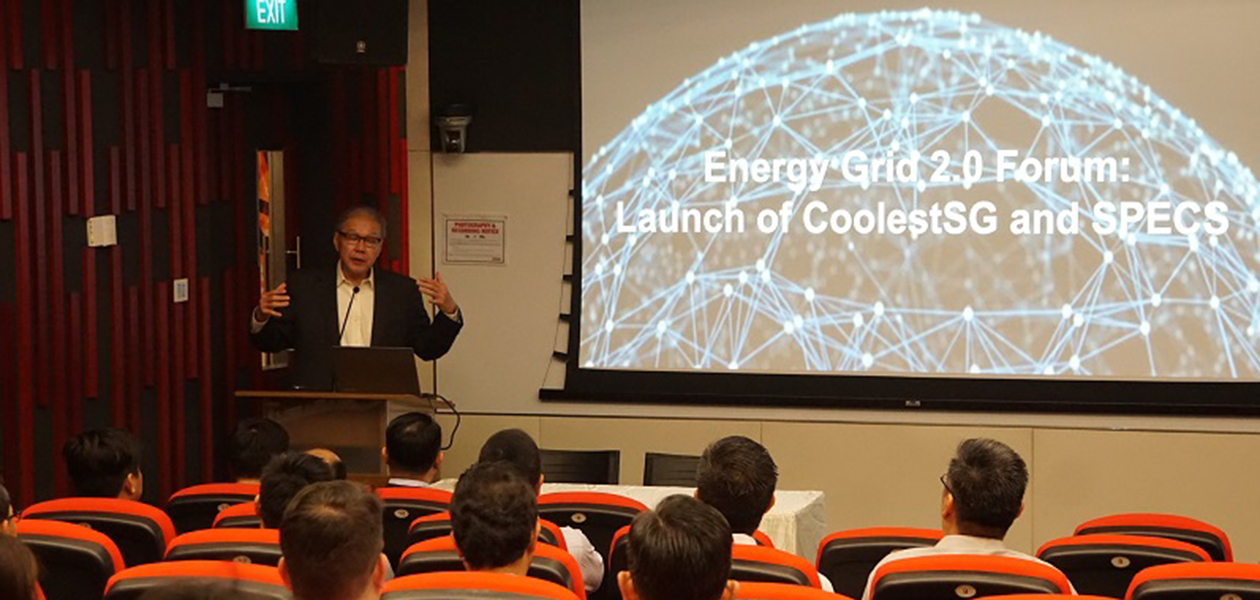The launch of SPECS and CoolestSG
Two consortia have been officially launched to spearhead efforts in commercialising technology for smarter energy and thermal management.
On the 25th anniversary of the United Nations Framework Convention on Climate Change, Singapore pledged to reduce its greenhouse emissions by 36 percent from 2005 levels by 2030. Being a tropical megacity, the island nation needs innovation—especially in the areas of energy efficiency—if it wants to meet this ambitious goal. But simply creating technology is not enough; a commercialisation pipeline that allows solutions to be scaled up and implemented is just as crucial.
Helping to take ideas and inventions out the laboratories and into the market are two new consortia: the Smart Grid and Power Electronics Consortium Singapore (SPECS) and the Cooling Energy Science and Technology Singapore (CoolestSG), officially launched at the Energy Grid 2.0 Forum held on 9 April 2019 at the headquarters of Singapore’s National Science Foundation. The launch event saw academics, energy industry experts and representatives from government agencies convene to explore opportunities for collaborative innovation.
A new dimension to energy systems
Acknowledging that Singapore is not alone in its quest for sustainable energy solutions, co-chairman of the management board at SPECS Professor Subodh Mhaisalkar highlighted four ‘D’s—decarbonisation, decentralisation, digitalisation and democratisation—as global challenges in the sustainable energy space.
Decarbonisation refers to the reduction of greenhouse energy emissions, he said, and is closely tied to the availability of renewable energy sources such as solar and wind energy. Meanwhile, the emergence of multiple suppliers or sources of energy [decentralisation], combined with the use of digital technologies, could lead to more efficient generation, distribution and consumption of energy via smart grids. “These developments will pave the way for democratisation of the energy sector, where you have prosumers or districts that can share energy with each other,” Mhaisalkar explained.
SPECS’ mission, therefore, is to allow companies to leverage the latest technologies in the smart grid and power electronics domain to help realise the four ‘D’s. From advanced semiconductors to novel mechanisms for routing energy, companies can select from a range of solutions at SPECS befitting their needs.
“The technology development at SPECS is mature owing to the institutes of higher learning. We are now looking forward to working with industry partners to achieve meaningful, tangible economic benefits. I'm happy to share that 22 companies have joined this consortium at this point,” said Mhaisalkar.
The hot topic: cooling
As attractive as a four ‘D’ system of energy generation and distribution may seem, the toll on the environment would still be severe if efforts are not taken to reign in energy consumption. In a hot and humid country like Singapore, a significant portion of total energy consumption comes from cooling.
“In fact, I would say that electricity consumption by cooling alone in Singapore could amount to something like 50 percent of the energy consumption of the economy,” said Professor Chou Siaw Kiang, chairman of the technical committee at CoolestSG. Hence, there is an urgent need for more energy-efficient cooling systems, alternative mechanisms to dissipate heat more effectively, or ways to recapture that heat for useful purposes.
This is where the CoolestSG consortium hopes to make an impact by bringing together researchers, government agencies and industry players to testbed and commercialise ‘cool’ innovations, such as radiant cooling systems, or solutions for thermal energy storage. Consortium members will also be able to participate in and direct projects, as well as enjoy commercialisation support and access to the IPI online marketplace, Professor Chou added.
IPI also organises innovations thematically as tech bundles, which have the added advantage of highlighting complementary technologies in a specific domain. Tech bundles thus give technology seekers a broader view of innovation opportunities, and both SPECS and CoolestSG have their own tech bundle pages aggregating inventions in their respective specialty areas.
Importantly, both consortia will help local companies and technology providers plug into a global innovation marketplace. Mhaisalkar highlighted that SPECS has partnered with a French Consortium, called Think Smart Grids, that brings together more than 300 companies in Europe in the smart grid space. Meanwhile, CoolestSG has collaborators in the US, Sweden and China, said Chou.
By banding together in the spirit of open innovation, both SPECS and CoolestSG hope to create pathways for the successful deployment of energy solutions in Singapore, and possibly, the world.

